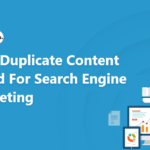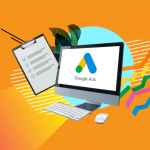The rapid advancement of artificial intelligence (AI) is revolutionizing digital marketing services, and nowhere is this more evident than in search engine marketing (SEM). From automating bid strategies to improving ad targeting and enhancing audience insights, AI-driven tools are helping businesses optimize their SEM campaigns more effectively than ever before. However, while AI offers numerous benefits, it also comes with its own set of challenges. In this article, we’ll explore how AI is being integrated into SEM strategies, discuss the tools available, examine the opportunities it presents, and address the potential pitfalls marketers need to be aware of.
The Role of AI in SEM
Search engine marketing relies on analyzing vast amounts of data, identifying patterns, and making real-time decisions to ensure maximum return on investment (ROI). AI, with its ability to process and interpret large datasets at incredible speeds, is an ideal solution for enhancing SEM performance. Machine learning algorithms can assess past campaign performance, predict trends, and optimize strategies to increase efficiency and effectiveness.
Some of the key areas where AI is being applied in SEM include:
- Automated Bidding – AI-driven bid management tools use historical data and predictive analytics to optimize bids for conversions, ensuring that advertisers achieve the best possible results within their budget.
- Ad Copy Optimization – AI can analyze which ad variations perform best and generate compelling ad copies based on audience behavior and engagement.
- Audience Targeting – AI helps identify and segment audiences more accurately, enabling marketers to tailor campaigns to specific user intents.
- Performance Analytics – AI-powered analytics provide deeper insights into campaign performance, helping marketers make data-driven decisions to refine their strategies.
Popular AI Tools in SEM
Several AI-powered tools are transforming the way digital marketers approach SEM campaigns. These tools leverage machine learning to improve efficiency, accuracy, and results. Some of the most popular AI-driven SEM tools include:
- Google Ads Smart Bidding – Google’s AI-powered bidding strategy adjusts bids in real-time based on user behavior, increasing the likelihood of conversions.
- Microsoft Advertising’s Automated Bidding – Similar to Google’s Smart Bidding, this tool helps optimize ad spend by using machine learning to analyze user data.
- Adzooma – This AI-driven SEM platform automates campaign management, offering real-time insights and optimization suggestions.
- PPC Samurai – A tool designed to automate and optimize SEM campaigns, enabling marketers to scale their strategies without excessive manual effort.
- ChatGPT & Jasper AI – These AI-powered copywriting tools assist in generating engaging and high-converting ad copy.
By leveraging these AI tools, businesses can streamline their SEM efforts, reduce manual labor, and increase their campaign effectiveness.
Opportunities AI Brings to SEM
AI is transforming SEM by offering numerous opportunities that marketers can leverage to stay ahead of the competition. Some of the most significant benefits include:
- Enhanced Efficiency and Automation
One of AI’s biggest advantages in SEM is its ability to automate repetitive and time-consuming tasks. Bid management, audience targeting, and performance tracking can all be handled with minimal human intervention, freeing up digital marketing professionals to focus on strategy and creative aspects.
- Better Audience Insights and Targeting
AI-driven SEM tools analyze user behavior, search history, and engagement patterns to create highly targeted ad campaigns. By understanding user intent more accurately, businesses can serve relevant ads that lead to higher conversion rates.
- Real-Time Decision Making
With AI’s real-time data processing capabilities, marketers can make instantaneous adjustments to their campaigns. Whether it’s tweaking bids, modifying keywords, or adjusting ad placements, AI allows for dynamic and agile campaign management.
- Cost Optimization
AI optimizes ad spend by allocating budgets to high-performing campaigns while reducing wasted expenditure on underperforming ones. This ensures a higher return on ad spend (ROAS) and improved cost efficiency.
- Improved Ad Copy and Creativity
AI-powered copywriting tools help generate compelling ad copy based on past performance data. These tools analyze successful ads and suggest content that resonates best with the target audience.
Challenges and Risks of AI in SEM
Despite the numerous advantages, AI in SEM is not without challenges. Marketers must be aware of potential pitfalls to effectively navigate the AI-powered landscape.
- Lack of Human Intuition
AI relies on data and patterns, but it lacks the human intuition and creativity that often play a crucial role in marketing. While AI can generate insights, it cannot fully understand brand nuances, emotions, or cultural contexts that influence consumer behavior.
- Dependence on Data Quality
AI is only as good as the data it processes. If the input data is flawed, biased, or outdated, the AI’s recommendations and predictions will be inaccurate, potentially leading to poor campaign performance.
- Privacy and Compliance Concerns
With stricter data privacy regulations such as GDPR and CCPA, AI-driven SEM strategies must ensure compliance with legal requirements. Collecting and utilizing user data for ad targeting must be done ethically and transparently.
- Complexity and Learning Curve
While AI tools simplify many processes, they also come with a learning curve. Marketers must invest time in understanding how these tools work, interpreting AI-generated insights, and integrating them effectively into their strategies.
- Over-Reliance on Automation
AI automation can sometimes lead to a ‘set-and-forget’ mentality, which may result in missed optimization opportunities. Human oversight is essential to ensure that AI-driven campaigns align with brand objectives and market changes.
The Future of AI in SEM
The integration of AI into SEM is still evolving, and the future looks promising. As machine learning algorithms become more sophisticated, AI will play an even greater role in enhancing SEM performance. Some potential future developments include:
- Hyper-Personalized Advertising – AI will refine personalization further by delivering ads tailored to individual user preferences in real-time.
- Voice Search Optimization – As voice search continues to grow, AI-driven SEM strategies will need to adapt to voice-based queries and natural language processing.
- Predictive Marketing – AI will provide predictive insights into future consumer behaviors, allowing businesses to anticipate trends and adjust campaigns proactively.
- AI-Powered Visual Search – Visual search is gaining traction, and AI will help optimize SEM strategies for image-based queries.
Conclusion
AI is reshaping SEM, offering digital marketing services powerful tools to enhance campaign performance, improve efficiency, and optimize ad spend. However, while AI presents incredible opportunities, it also comes with challenges that require strategic oversight and careful implementation. Marketers who embrace AI while maintaining a balance between automation and human creativity will be best positioned to succeed in the evolving world of search engine marketing.






